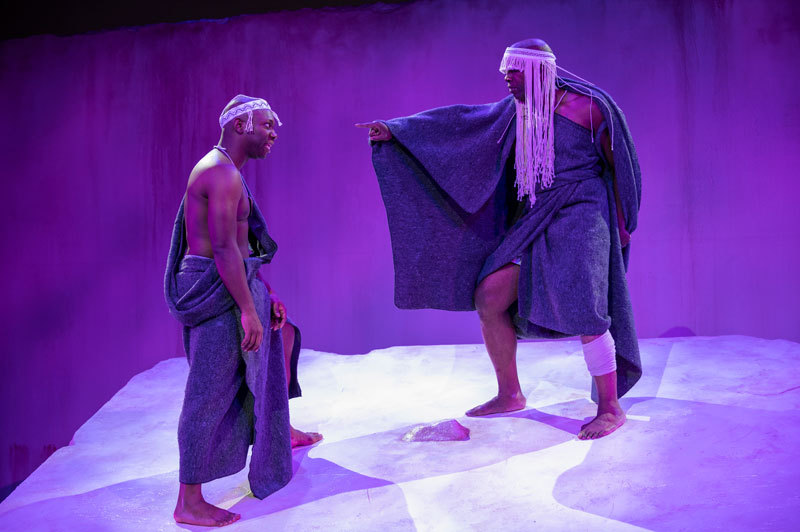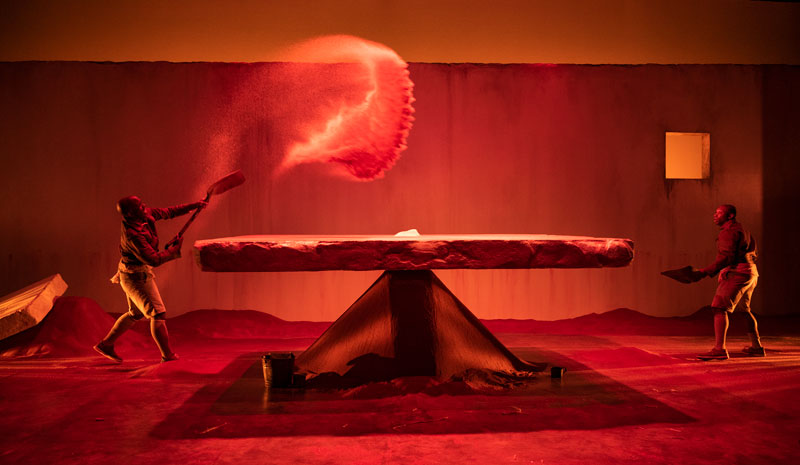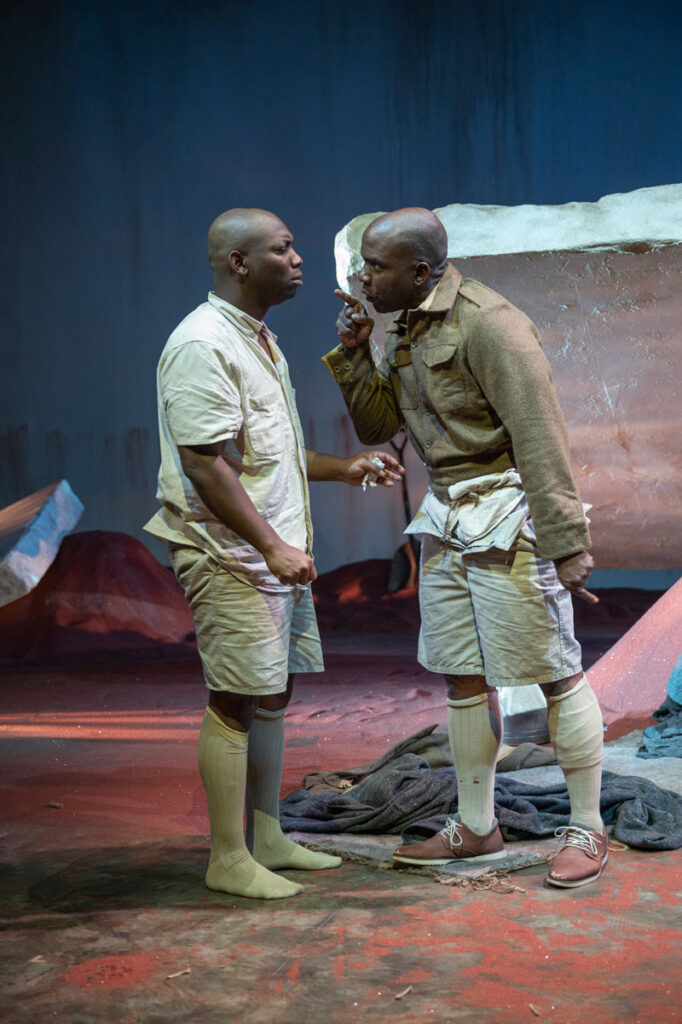
A long stretch of silence opens The Island. Two men stand facing the audience; providing a good look of their outer selves. Young, vital, Black. Their faces appear resolute. Quietly determined. Eventually, still in silence, they move more deeply into character. Hands cross at the wrist as if they’re handcuffed. Their feet move as if they’re bound as the two men circle the stage. They’re signaling captivity. When the shackles are gone, they work to exhaustion. We don’t hear them speak until they’ve collapsed in their cell; weak, bruised and disgruntled. By then, we have a taste of the psychological cost of relentless forced labor.
An apartheid era play written over twenty years ago by Athol Fugard, John Kani and Winston Ntshona, The Island burrows into the lives of Winston (Ronald L. Conner) and John (Kai A. Ealy). They’ve been cellmates on South Africa’s notorious Robben Island for three years. During the apartheid regime, Robben Island only held Black men charged with political offenses targeting the prevailing system of government sanctioned repression. Most of the world knows of its most famous inhabitant, Nelson Mandela. Until apartheid was extinguished in the late 90s, thousands of men were confined and subjected to degrading conditions and punishments on the island. Winston burned his pass card and was condemned to a life sentence there.
Necessity may have contributed to their friendship, but a genuine respect could be detected between these two prisoners. They help each other recover from their grueling days and honor one another’s need for deference. United in their double-edged hatred and fear of their guards, whose chief objective is shatter their will, the two men live by an unspoken pact. Theirs is the kind of allegiance you hear in their banter. It’s most pronounced as they prepare for a theatrical performance they’ve committed to enacting in the prison; a competition between prisoners. They’re to perform Antigone by Sophocles and Winston is not keen on playing the role of a woman. He also doesn’t seem particularly committed to learning his lines. John cajoles and assures him that his fellow prisoners may laugh at him at first but will take him seriously by the time their presentation ends. Winston may not be persuaded by John’s encouragement, but his refusal to perform the part doesn’t have the ring of finality. You feel his duty to stand with his friend will supersede any embarrassment concerns.

We never get an explicit reason why Antigone became their performance choice. Considering the plight of the two men, it was as savvy as it was subversive. As one of the earliest Greek tragedies, Antigone is a story of moral right challenging the immoral dictates of brute power. Sentenced to death for burying her brother against the will of the king, the physical embodiment of the state, Antigone chose to sacrifice her life to honor the dignity of her brother.
Shortly before the theatrical competition takes places, John is taken away. His life is about to change profoundly. Fearing a punishment for some real or manufactured infraction, both he and Winston are resigned for the worst. Instead, good news was delivered. John’s appeal had been reviewed and granted. He’s to be released in three months. The shock stuns both men. Winston’s joy for John is real, extravagant and full of uproarious fun as he teases his friend about all the things he’s going to be able to do when he is again able to live free. Winston also begins to think about his own future. Happiness for his friend turns to rage at his own plight. With a life sentence and no chance of appeal, Winston knows what his future will be. He’s seen it in other men there, the ones who after years and years of incarceration finally succumbed, broken. Men who completely detached themselves from reality and became meek zombies parodying life. The prospect angered and terrified him. John’s consolations reminding him that the actions that got Winston and himself to the island will benefit coming generations failed to placate. In that moment, Winston’s inability to change his life infuriated him. A powerful and wrenching scene, Conner as Winston shines brilliantly as a man coming to grips with unjust subjugation as his only tomorrow.

Throughout the production, Gabrielle Randall-Bent’s direction remained imaginative and fascinating. You’d expect a two person play to be tight and focused, but Randall-Bent’s guidance also enhanced the play’s urgency and purpose. That was particularly true during Winston’s moment of catharsis when he learned of John’s imminent release. Although it felt like a culmination, it was just another step to an even more memorable conclusion.
In their skit, Winston puts aside his reservations about playing Antigone, leaving John to take on the role of King Creon. The comic antics of their practicing their parts in their cell are gone in this final enactment. After a short monologue where the King flatters his subjects with self-deprecating humility, the tone of his speech soon darkens. He condemns his foes and those who conspire against him. An insurrection has just been put down and two of Antigone’s brothers were involved. One was on the side of the King, the other fought with the rebels. Both were killed and the King was about to take Antigone’s life for ignoring his edict forbidding the burial of his foes. His words of condemnation are met with challenge from Antigone and the warfare of words that builds between them glisten with fire. Both actors deliver shimmering performances. Their words slash with elegant precision, creating a powerful scene of conflict between wills. Just as they do now and they did in ancient Greece, the same battles of domination and resistance have been raging for thousands of years all around the globe. With it’s clear message of defiance, we’re left to wonder whether the performance carried a cost for two men who chose resistance while still inside the lion’s jaws.
The Island
Through December 4, 2022
Court Theatre
5535 S. Ellis Ave.
Chicago, IL 60637